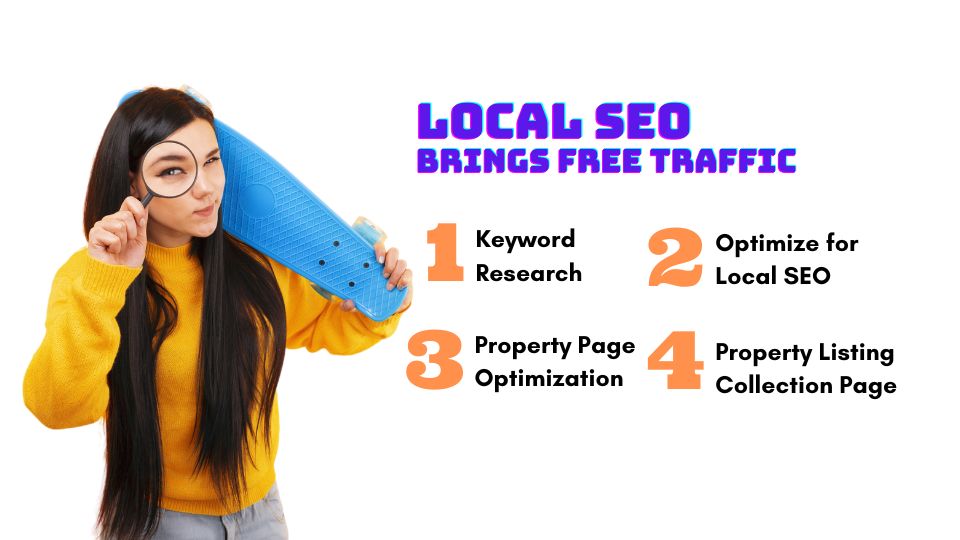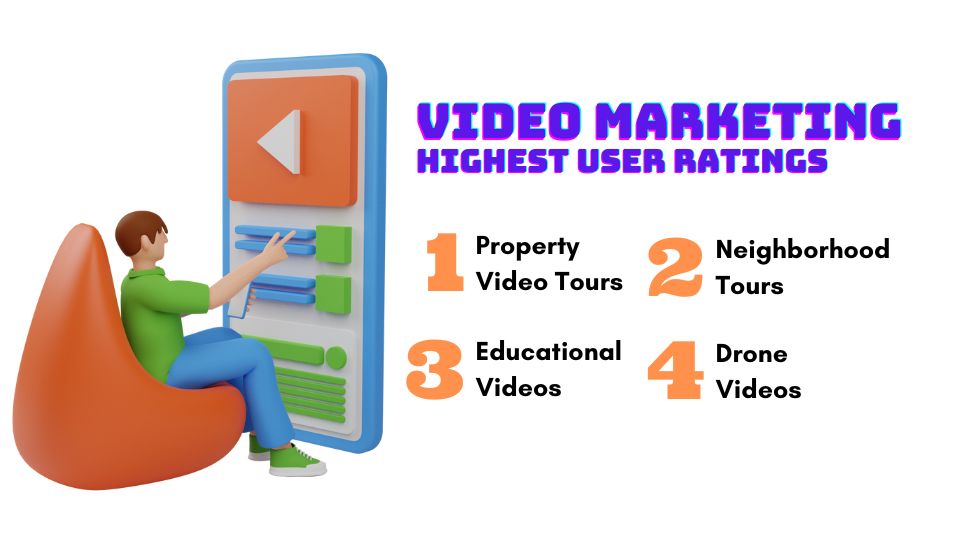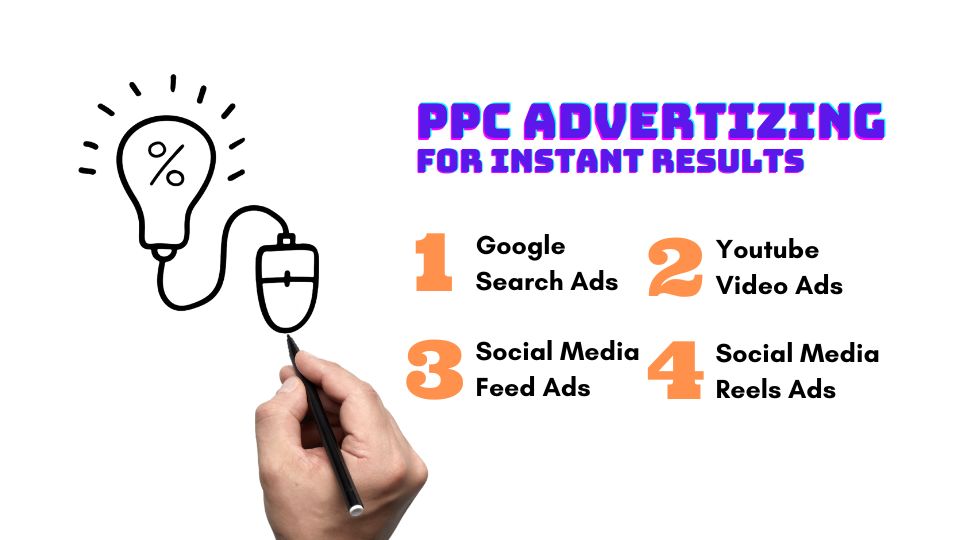7 Ways to Use Digital Marketing for Real Estate
In today’s technology-driven world, the real estate industry has experienced a dramatic shift in how properties are marketed and sold. Real Estate Digital marketing has emerged as a dominant force, opening up a new landscape of opportunities for real estate professionals to reach a broader, more targeted audience.
The power of digital marketing in real estate lies in its ability to provide precise, cost-effective, and interactive ways to showcase properties. It allows realtors to leverage various channels – from social media and search engines to email campaigns and virtual reality tours – to connect with prospective buyers and sellers. Furthermore, real estate digital marketing tools provide valuable insights that can help to better understand clients’ preferences, optimize campaigns, and ultimately, boost sales.
Recent statistics reinforce the importance of digital marketing in the real estate business. According to the National Association of Realtors, 93% of home buyers use online websites in their home search, and 73% of buyers say that they would use their agent again or recommend their agent to others if the agent has a strong online presence.
Additionally, real estate businesses that make use of video content receive 403% more inquiries than those that don’t. These numbers underline the significant role that digital marketing plays in the current real estate market scenario.
With these emerging trends, it’s crucial for real estate businesses to adapt and take full advantage of the vast possibilities that digital marketing presents. In this blog post, we will explore 7 ways to effectively use digital marketing strategies in real estate to boost sales and stay ahead in this competitive market. So, let’s dive in!
1# Use of Social Media Platforms
The power of social media in today’s digital marketing landscape cannot be overstated. Platforms such as Facebook, Instagram, and LinkedIn provide vast audiences and tools that can be effectively leveraged for real estate social media marketing strategy.

Facebook continues to be a major player
With over 3.1 billion active users worldwide as of 2023 Facebook can play a vital role in real estate digital marketing. By building a company page, posting updates about new properties, sharing compelling blogs, and conducting targeted ad campaigns, real estate professionals may reach a wide audience.
Encourage satisfied customers to submit good reviews on your page to boost your reputation and influence new purchasers.
Instagram is an Exceptional Tool, with its focus on visuals
Your postings can stand out with stunning property photos, ‘before and after’ remodeling photos, virtual tours, or behind-the-scenes realtor photos.
Instagram Stories and Reels can be used for brief tours, buying/selling process Q&As, and customer testimonials.
LinkedIn connects with other professionals and potential clients
Sharing industry insights, market trends, and professional achievements on LinkedIn can help establish your reputation as an area expert. LinkedIn’s ad platform can also be used to target users who may be looking to invest in real estate.

In essence, each social media platform offers unique ways to connect with different audiences. Consistent posting of high-quality content that resonates with your target audience, coupled with the strategic use of paid advertising, can drive significant engagement, and, ultimately, increase property sales.
Plan a well-researched and optimized social media marketing strategy for the best results.
2# Invest in Search Engine Optimization (SEO)
As more and more homebuyers start their property search online, being easily discoverable in search engine results is crucial for any real estate business, it improves visibility in search engine results pages (SERPs), driving more organic (unpaid) traffic to your site.

Here are some SEO tips specifically for real estate marketing:
Use Relevant Keywords
Keywords are the terms and phrases that potential clients type into search engines when looking for real estate listings or agents.
By researching and using relevant keywords in your website content, meta tags, URLs, and ALT tags, you increase your chances of ranking higher in search engine results for those terms.
Local SEO Techniques
Local SEO is crucial in the real estate field since it’s all about location. Make sure your website is optimized for local search by claiming and optimizing your Google My Business listing, using location-specific keywords, and gathering positive customer reviews.
Optimize Property Listings
Every property listing on your website is a new opportunity to attract organic traffic. Make sure each listing is optimized with keywords in the title, description, and image ALT tags. It’s also beneficial to write unique descriptions for each property instead of using generic descriptions.
Optimize Images
High-quality images are vital in the real estate industry, but large image files can slow down your site—a factor that can negatively impact your SEO. Compress your images to maintain site speed and ensure each image file is named descriptively and uses ALT tags to improve your SEO.
Website Speed and Mobile Optimization
Site speed is a ranking factor for Google, and with the increasing use of mobile devices to access the web, having a mobile-optimized website is essential. Make sure your website is responsive and loads quickly to provide a good user experience and boost your search engine rankings.
By investing in SEO, you can improve the visibility of your real estate website, attract more targeted traffic, and ultimately, increase the chances of converting website visitors into potential leads and sales.
3# Create High-Quality Content
High-quality content is the cornerstone of any successful digital marketing strategy. For the real estate industry, providing informative, valuable, and engaging content not only helps attract and retain potential buyers, but it also builds your brand’s credibility and authority.

Let’s explore some examples of content that can provide value and attract potential buyers:
- Blog Posts: Blogs are an excellent way to provide in-depth information to your audience while also improving your SEO. Topics could range from tips on buying or selling a home, understanding real estate market trends, to neighborhood guides, and home maintenance advice. Regularly posting useful articles can help position you as a trusted resource in the real estate industry.
- Infographics: Real estate is filled with statistics and data that can be overwhelming to some. Infographics can help simplify this information in a visually appealing way. For example, an infographic could illustrate the steps to buying a home, current real estate market trends, or compare various neighborhoods in a city.
- E-books: E-books can provide comprehensive guides to your audience and can also serve as an effective lead generation tool. You could offer a free e-book on topics like “The Comprehensive Guide to Buying Your First Home” or “What to Know Before Selling Your Home” in exchange for a visitor’s email address.
- Videos: Videos are highly engaging and are great for showcasing properties and providing virtual tours. Additionally, videos offering advice on the home buying process, testimonials from happy clients, or neighborhood tours can be very effective.
- Newsletters: Regular newsletters can help keep your audience informed about new listings, recent blog posts, industry news, and more. A well-crafted newsletter can help you stay top of mind with potential clients and keep your audience engaged with your brand.
- Social Media Posts: Regular posts on social media platforms can help keep your audience engaged and spread awareness about your listings. These can be quick updates, behind-the-scenes looks, or even short, informative pieces of advice for buyers and sellers.
Creating high-quality content requires time and effort, but it’s an investment that pays off. By providing valuable content, you can attract and retain potential clients, improve your online visibility, and establish your brand as a trusted authority in the real estate industry.
4# Use Email Marketing
In the age of social media and advanced digital technologies, email remains one of the most effective ways to communicate directly with potential and existing clients.
Email marketing can help real estate professionals nurture relationships, provide valuable content, and keep their audience informed about new property listings, open houses, and market updates.

Here are some ways to leverage email marketing effectively:
Real Estate Updates Newsletters
Regular newsletters keep your audience informed and engaged with your brand. These can include property updates, industry news, home maintenance tips, or links to your recent blog posts.
Make sure your newsletters are visually appealing, easy to read, and always provide value to the recipient.
Real Estate Drip Campaigns
Drip campaigns are a series of pre-written emails that are automatically sent to a user over a period of time.
These can be very effective in nurturing leads – for example, you could have a series of emails for new subscribers that provides them with helpful information about the home buying process.
New Relevant Property Alerts
If a client is looking for a specific type of property, setting up property alerts that inform them about new listings that meet their criteria can be very beneficial.
This keeps them engaged with your services and makes their property search easier.
Personalized Emails: Personalized emails can help strengthen your relationship with your clients. These can be birthday or holiday greetings, congratulations on a home anniversary, or personalized property recommendations based on their preferences.
Email Analytics: It’s important to track the performance of your emails using analytics. Look at metrics like open rates, click-through rates, and conversion rates to understand what content resonates with your audience and to make necessary adjustments.
Remember, the key to successful email marketing is to provide value, stay consistent, and always respect your subscribers’ inboxes. Make sure each email you send serves a purpose and brings your clients one step closer to making a real estate transaction.
With effective email marketing, you can maintain and nurture relationships with your clients, keeping your brand at the forefront of their minds when they’re ready to make a decision.
5# Video Marketing in Real Estate Industry
In an era where visual content is king, video marketing has emerged as one of the most impactful ways to showcase properties and engage with potential buyers.
In fact, according to the National Association of Realtors, real estate listings with video receive 403% more inquiries than those without. From virtual tours to neighborhood highlights, video allows potential buyers to explore properties from the comfort of their own homes, providing them with a realistic, immersive experience.

Here are some ways to effectively use video marketing in real estate:
- Virtual Tours: They let buyers tour a property from home. High-quality, 360-degree virtual tours can transform property searches, especially for out-of-town clients.
- Listing Videos: Listing videos can provide a dynamic view of the property, going beyond what photos can offer. These videos can include drone footage to showcase the property from different angles, highlight key features, and even give a glimpse into the surrounding neighborhood.
- Neighborhood Tours: Videos showcasing the local community can help prospective buyers understand what it’s like to live in the area. These can highlight local businesses, schools, parks, and other amenities, giving buyers a feel for the lifestyle and culture of the neighborhood.
- Educational Videos: Videos that educate your audience about the buying or selling process, real estate trends, or home improvement tips can help establish you as a knowledgeable resource. These can be shared on your website, social media, and email newsletters.
- YouTube: You can post your property videos, virtual tours, client testimonials, and educational content on your channel and optimize these videos for SEO to increase their visibility.
The key to successful video marketing is quality. Invest in a good camera, learn basic editing skills, and plan your videos carefully. Remember, your videos represent your brand and the properties you’re selling which plays a very important digital marketing strategy. With high-quality videos, you can effectively showcase properties, engage your audience, and ultimately drive more sales.
6# PPC Advertising for Real Estate Business
Pay-Per-Click (PPC) advertising is an effective method to drive targeted traffic to your real estate website. Unlike organic traffic methods like SEO, PPC allows you to reach potential clients quickly by placing paid ads on search engines and social media platforms.

PPC ads are beneficial for real estate digital marketing strategy as they allow you to target specific demographics, locations, and user behavior. Here’s how you can create effective real estate ads:
Google Ads: the most popular PPC advertising platform
With Google Ads, you can create ads that appear on Google’s search engine results pages (SERPs) and other Google properties. To make your ads more effective, make sure they have compelling headlines, a clear call-to-action (CTA), and a link to a relevant landing page.
Real Estate Social Media Advertising
Facebook, Instagram, and LinkedIn platforms can target adverts based on user’s demographics, interests, behaviors, and website interactions. Facebook advertising can target “likely to move” or high-income people. Your properties’ video, carousel, or picture adverts can draw consumers to your website.
Real Estate Website Visitor Remarketing
Remarketing or retargeting is a PPC strategy that targets users who have previously interacted with your website but didn’t convert (like submitting a form or contacting you). By setting up remarketing campaigns on Google Ads or social media platforms, you can show tailored ads to these users, reminding them of the properties they viewed and encouraging them to take action.
Monitor Your Campaigns: PPC requires ongoing management. Monitor your campaigns regularly to understand which keywords and ads are driving results, and adjust your strategy accordingly.
In conclusion, while PPC requires investment when used strategically, it can provide a significant return by attracting more qualified leads to your real estate website, boosting visibility, and driving sales.
7# Invest in a Professional and User-Friendly Website
In today’s digital age, your website is often the first point of contact potential clients have with your business. As such, it needs to make a strong first impression, be easy to navigate, and offer value to visitors. For real estate professionals, a high-quality website is not just a nice-to-have but an essential business tool.

Here are some key features to consider when designing a professional and user-friendly real estate website:
- Clean, Professional Design: The design of your website should reflect the quality and professionalism of your services. Opt for a clean, modern design with high-quality images and a consistent color scheme. Avoid clutter and make sure information is easy to find and read.
- Easy Navigation: Users should be able to find what they’re looking for with ease. Ensure your site has a logical navigation structure with clearly labeled tabs and pages.
- Property Search Function: Make it as easy as possible for visitors to find the property they’re looking for. An advanced search function that allows users to filter properties by location, property type, price range, and other criteria can significantly enhance the user experience.
- High-Quality Property Listings: Each listing should include high-quality photos (and ideally a video tour), a detailed and compelling property description, key features, and location information. The more information you provide, the easier it is for potential buyers to decide if they’re interested.
- Blog Section: As discussed earlier, providing valuable content through a blog can help attract visitors, improve your SEO, and position you as an expert in your field.
- Contact Forms: Make it easy for visitors to get in touch with you. Include contact forms on your property listing pages and on your Contact Us page.
- Mobile-Friendly Design: More people are using their smartphones to browse the internet than ever before. Your website should be responsive, meaning its layout should adjust to fit any screen size, be it a desktop, tablet, or smartphone.
- Loading Speed: A slow website can frustrate visitors and lead them to leave, potentially losing a client. Ensure your website loads quickly by optimizing images and using reliable website hosting.
- Client Testimonials: Showcase reviews and testimonials from past clients to build trust and credibility.
Investing in a professional, user-friendly website is key to online success in the real estate industry. It serves as the foundation for your digital marketing efforts and, when done right, can be a powerful tool for attracting and converting leads.
The dynamic world of real estate is constantly evolving, and with the advent of digital technology, it’s more important than ever to stay ahead of the curve. Harnessing the power of digital marketing can make a significant difference in your ability to attract and convert potential clients, ultimately boosting your real estate sales.
Real estate digital marketing strategy
To recap, here are the key strategies we’ve explored:
- Utilizing Social Media Platforms: Engage with your audience and showcase your properties with high-quality images, videos, and captivating content.
- Investing in Search Engine Optimization (SEO): Boost your website’s visibility on search engines by using relevant keywords and optimizing your property listings and content.
- Creating High-Quality Content: Build credibility and provide value to your audience with insightful blog posts, infographics, e-books, and more.
- Using Email Marketing: Nurture relationships with potential and past clients through engaging newsletters, drip campaigns, and personalized property alerts.
- Leveraging Video Marketing: Showcase properties and provide virtual tours with high-quality videos.
- Using Pay-Per-Click (PPC) Advertising: Target specific demographics and locations to attract qualified leads quickly.
- Investing in a Professional and User-Friendly Website: Make a strong first impression and provide a seamless user experience with a well-designed, informative website.
Each of these strategies plays a crucial role in a comprehensive digital marketing plan for real estate. Start by assessing your current digital marketing efforts, then take steps to implement the strategies that align best with your real estate business goals. Remember, successful digital marketing doesn’t happen overnight; it’s a continuous process that requires testing, analyzing, and adjusting. With time and effort, these strategies can significantly boost your online visibility, generate more leads, and ultimately, increase your real estate sales.
The future of real estate marketing is digital, and by adopting these digital marketing strategies, you can ensure your business remains competitive and successful in this fast-paced market. Happy selling!